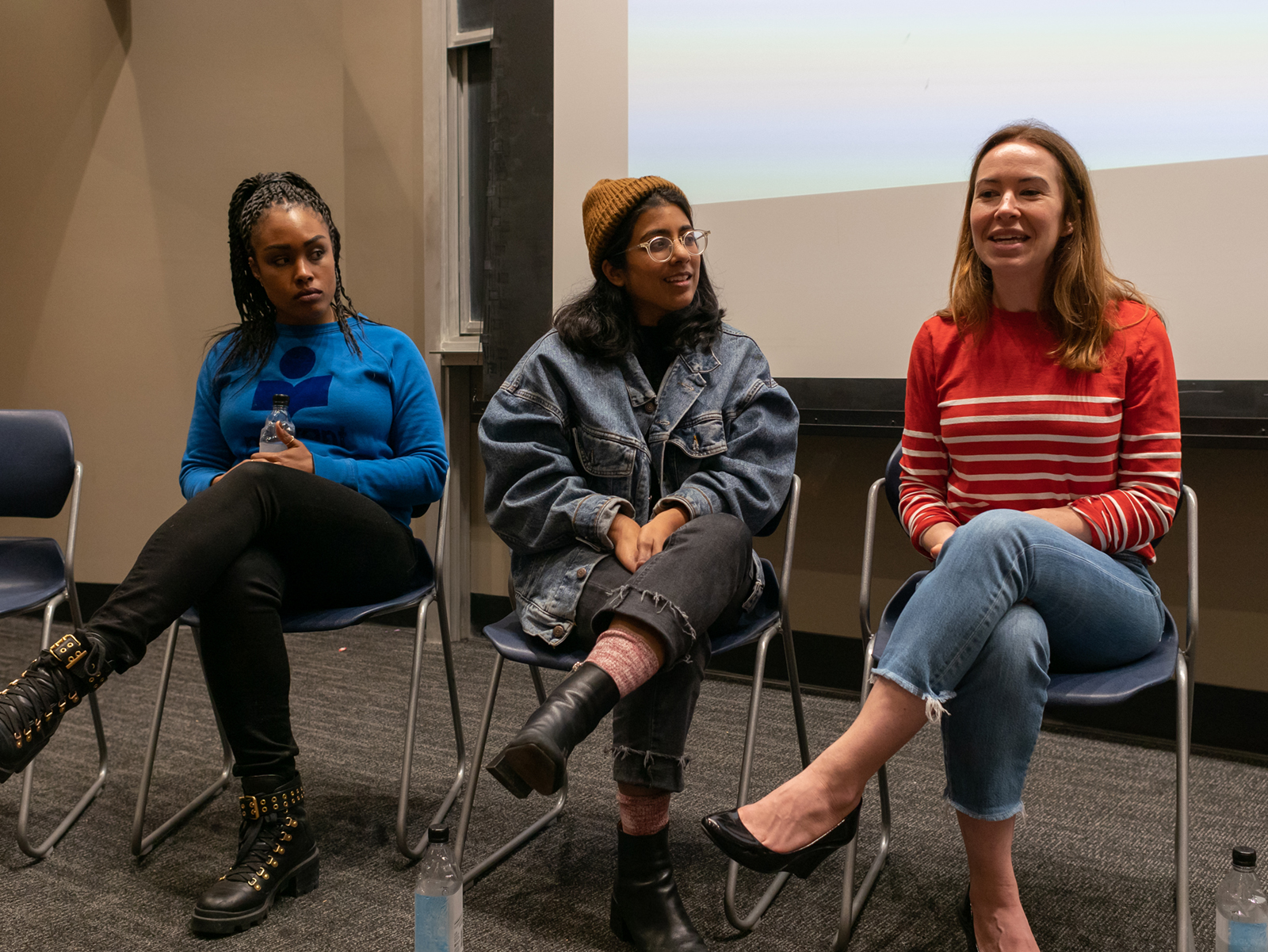Panel of women in entertainment discusses Hollywood’s lasting inequities

Television writer Kara Brown, writer and director Minhal Baig and screenwriter Katie Silberman spoke in Bruin Film Society’s Women in Entertainment Speaker Series, where they discussed their experiences working as women in Hollywood. (Courtesy of Juan Díaz, Bruin Film Society)
By Umber Bhatti
March 7, 2019 3:35 p.m.
When Katie Silberman moved from Nebraska to Los Angeles to pursue a career in Hollywood, she emailed 50 of her favorite screenwriters. Though she only received one response, she said that email helped her break into the entertainment industry.
Her writing credits now include several films, including Netflix comedy “Set It Up,” Warner Bros. rom-com “Isn’t it Romantic” and Olivia Wilde’s upcoming “Booksmart.”
Silberman was one of three writers present at Wednesday night’s Women in Entertainment Speaker Series hosted by Bruin Film Society. Other speakers included former journalist and television writer Kara Brown and writer and director Minhal Baig, who spoke about their experiences as women in the industry. Priyanka Kapoor, a third-year political science student and the vice president of BFS, said the club’s ongoing speaker series aims to provide a space for voices that aren’t usually heard in Hollywood.
“Unfortunately, these women’s voices aren’t always given the platform that they should be,” Kapoor said. “But they’re just ultimately really good at their job, and so it’s also a matter of hearing people who are experts at what they do.”
The panel was moderated by Kapoor and BFS event coordinator Kevin Yang, a fourth-year political science and economics student. For Brown, the transition from a solitary writer at Jezebel to working in a writer’s room for “Grown-ish” was a surprisingly enjoyable one, as she said she tends to be an independent person. Silberman also said multiple perspectives are important when writing comedy scripts, as several revisions and perspectives are needed to sharpen the humor.
Though the panelists gravitate toward different genres, Brown’s work is currently focused on romantic comedies. She joked with the audience, saying films of the rom-com genre are the only ones typically directed by women and include at least two female characters – the lead and her best friend.
[RELATED: Second Take: List of best director nominees indicate gender inequity remaining in Hollywood]
However, Brown also chose to write rom-coms for more personal reasons. As a black woman, Brown wanted to create stories where black characters can be carefree. Many films about African-American people – like “Selma” or Nate Parker’s “The Birth of a Nation” – focus on slavery or civil rights. Brown said she is tired of seeing black people constantly suffering on-screen – there should be more lighthearted films and projects across various genres that feature black leads.
“First of all, I think we should be learning about slavery in classrooms with books. I don’t think your main introduction to the horror of it should be through a movie theater,” Brown said. “But, also, I want to see black people on screen doing fun stuff … I want to watch a movie and feel good at the end of it.”
Toward the end of the event, the moderators opened the floor to audience questions, one of which focused on the difficulty of being chosen for writing and directing fellowships. Baig said she also is disheartened by the process, and even wrote an op-ed in The New York Times about the struggle women, especially women of color, face in order to gain recognition in the industry.
However, she said posting creative work on platforms such as Vimeo and YouTube helps people distribute their own projects instead of relying on others. She cited an example of her friend Fatimah Asghar, who released her web series “Brown Girls” on streaming platforms before it was bought by HBO.
“If you want to make something, go make it. Write your feature, write your TV pilot,” Baig said. “Go and create a short film with your friends or a web series. I really think you should just make the thing and put it out into the universe.”
The discussion then turned toward diversity as a female audience member asked if the term has been reduced to an industry buzzword. All three panelists disagreed with the sentiment, and said it is still important to fight for a diverse crew. Silberman said she was lucky in that three of the five films she’s worked on were directed by women – but that is often not a trend in Hollywood.
[RELATED: Film archive series to shed light on Hollywood’s unrecognized female directors]
While shooting her film “Hala,” Baig said she was open to hiring both men and women for positions. But when she asked for crew suggestions, she only received recommendations of white men, and needed to specify that she was also looking for women and people of color. Brown said it is important to fight against the standard in Hollywood, which tends to be white and male.
In the aftermath of the #MeToo movement, student attendees said events that uplift women’s voices are important. Lindsay Opoku-Acheampong, a graduate directing student, said she attended the panel because she wanted to see how women are shifting the film industry. She was especially interested in learning about Baig’s story following the success of “Hala” at the Sundance Film Festival. Jahmil Eady, a graduate screenwriting and directing student, also said she wanted to hear from women who have attained success in the industry.
“I’m interested in hearing about the personal experiences of other women who work in the industry and who are doing what I hope to do one day,” Eady said. “I’m super excited that it’s primarily women of color speaking.”

